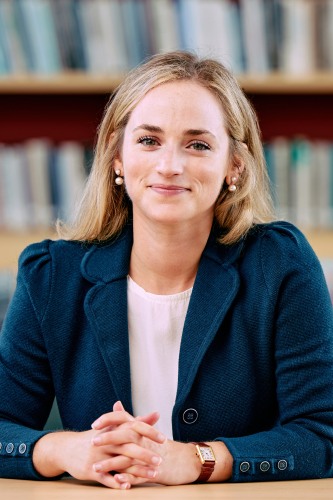
Blair Sackett
Biography
Blair Sackett is a Postdoctoral Fellow in International and Public Affairs at Brown University. She completed her Ph.D. in sociology at the University of Pennsylvania. In a period of rising forced migration, due to war and political upheaval as well as climate change, her research focuses on refugees and the organizational obstacles and opportunities they face in accessing rights and resources. Her first book, "We Thought It Would Be Heaven: Refugees in an Unequal America" (University of California Press), co-authored with Annette Lareau, reveals how the very social service organizations meant to help resettled refugees can derail their progress in building a new life in the United States. Her second book project examines the reverberations of national policy and humanitarian practice on refugee families’ economic strategies and social networks in a refugee camp in Kenya. Her research has been supported by a Fulbright-Hays DDRA Fellowship and Swahili language training through U.S. Department of Education Foreign Language and Area Studies Fellowships.
Sackett is also an affiliated scholar with the Center for Human Rights & Humanitarian Studies at Brown University and the Institute for the Study of International Migration (ISIM) at Georgetown University.
Research
Sackett’s research focuses on how seemingly neutral organizational processes shape the distribution of resources and, thus, inequality. She is the first author of a co-authored book (with Annette Lareau) We Thought It Would Be Heaven: Refugees in an Unequal America with the University of California Press. Fleeing war and violence, many refugees dream that moving to the United States will be like going to Heaven. Instead, they enter a deeply unequal American society, often at the bottom. Based on extensive ethnographic observations and interviews with Congolese refugee families and aid workers and volunteers, We Thought It Would Be Heaven examines the obstacles refugees face across an array of American institutions—from schools to welfare offices. Seemingly small organizational errors—missing a deadline, mistaking a rule, or misplacing a form—tangle processes and impede access to crucial resources, threatening to become barriers to upward mobility. Published in August 2023, the book has been covered in media outlets, including NPR’s The Indicator from Planet Money.
The majority of the world’s refugees live in the Global South, and Sackett is currently working on her second book project, Dreams Derailed, which reveals how long-term displacement disrupts refugees’ economic livelihoods in Kakuma refugee camp in Kenya. Based on over 14 months of ethnographic observation, this book project examines how government policies and humanitarian practices shape refugee families’ economic strategies, social networks, and community organizations as they seek to rebuild. This research has received support from the Fulbright-Hays DDRA Fellowship and Swahili language training through U.S. Department of Education Foreign Language and Area Studies Fellowships.
Teaching
Introduction to Sociology
How Global Systems Shape Refugee Families
The Third Sector: Non-profits, NGOs, and Humanitarian Organizations